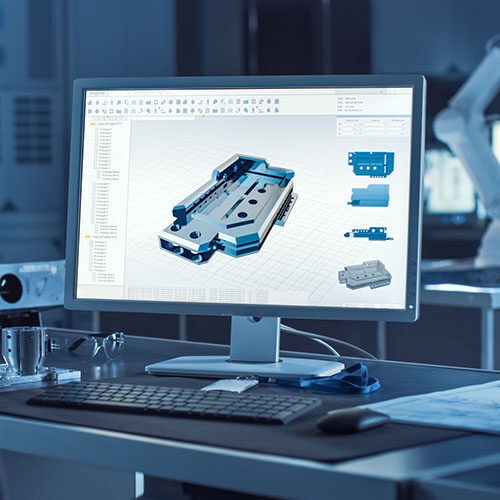
With two months of 2019 already under our belt it’s time to look at the top trends in manufacturing that will have a major impact on the industry in 2019 and beyond. Although we don’t have a crystal ball and can’t perfectly predict the future, we believe the following seven trends are already changing manufacturing and will continue to have a major influence on the industry this year and in years to come:
1. Industry 4.0
Automation continues to be the buzzword on everyone’s lips, and it is one that is not going away anytime soon. Many experts think we are currently in the midst of a new industrial revolution — Industry 4.0 — which is bringing an increasing level of digitization, automation, and inter-connectivity to the manufacturing sector.
2019 is the year to take this new industrial revolution seriously, and start thinking how it will impact your business. According to Deloitte “Overall, just over 20 percent of manufacturers rated themselves as ‘highly prepared’ to address the emerging business models the fourth industrial revolution brings. The coming year is one that is expected to separate the digital leaders from the followers, and it could leave some companies dangerously behind.” Currently, only half of manufacturers report using some level of automation in their business processes, but with Industry 4.0 underway, experts expect to see a major investment in automation by manufacturing firms in 2019. Embracing new digital technology will be an important feature in determining which companies emerge strong and competitive, and which companies lag behind in, the new world of Industry 4.0. New technologies like 3D printing and blockchain, are being taken up by industry leaders and will start to go mainstream this year.
2. Lack of Labour Resources
Too many job openings, and not enough workers to fill them is another trend that has been around for a few years and doesn’t seem like it is going anyway anytime soon. A lack of skilled labor has been plaguing the industry for the last few years, and the problem is only growing: Deloitte estimates that in ten years time there will be over 2.4 million unfilled manufacturing jobs in the United States. Not only does this have a major impact on your bottom line, as it makes it difficult for your shop to run at full capacity it, and get jobs out the door on time, it can have other more intangible impacts. For example, as more and more Baby Boomers retire and leave the industry, and you don’t have anyone to fill their shoes, it also means a loss of all the institutional knowledge your outgoing workers have, which can be problematic for your business.
Another issue? Attracting tech workers to the manufacturing industry. As the industry embraces new technology and becomes a more and more technologically advanced field, manufacturers are going to have to figure out ways to make their industry more appealing to tech-savvy workers like coders, data scientists, and app developers — not the types of workers traditionally attracted to the industry. Manufacturers need to start thinking now how they can recruit the talent their shops need to thrive in Industry 4.0.
3. Evolution of Traditional Industry Software
More and more SMEs in the manufacturing sector are turning to ERPs to help them stay competitive and thrive in this new manufacturing environment, as ERPs help manufacturers connect their entire organization, automate business processes, and gather real-time data about their operations. SMEs who sometimes feel left out of, or lacking the resources to embrace, big trends can use ERPs to help them automate their shops, and meet the demands of Industry 4.0.
And as small and mid-sized manufacturers become more and more reliant on ERPs to run their businesses, ERPs are stepping up their game and becoming more connected and more intuitive to help manufacturers meet the myriad of demands being placed on them. Many ERPs are embracing cloud-computing, more user-friendly interfaces, and integrating with IoT and other cutting-edge technologies to help streamline manufacturing processes. ERP systems can also help companies harness their data and analyze it to make key business decisions, and deal with the pressing needs and concerns of the ever changing, ever demanding manufacturing industry. (Curious? Learn what Genius Solutions VP of Services has to say about using ERPs to leverage your data to help deal with the labor shortage in the manufacturing industry here). Software providers, like manufacturers themselves, understand that we are at a crossroads in the industry and are stepping up their game to help manufacturers compete and succeed.
4. Internet of Things
Linked to Industry 4.0 is the Internet of Things (IoT), another tech-heavy trend that is hitting the manufacturing industry hard in 2019. Over the last few years there has been a lot of talk about the IoT, but 2019 is emerging as the year that IOT is having a major impact on the manufacturing sector. Manufacturers are increasingly leveraging the Internet of Things (IoT), which entails the interconnection of unique devices within an existing Internet infrastructure, to achieve a variety of goals including cost reduction, increased efficiency, improved safety, meeting compliance requirements, and product innovation.
Forbes predicts that by 2020 spending on IoT technologies, solutions and apps will reach 267 billion USD, with much of this boom in spending to come from the manufacturing industry, as it digitally transforms and connects its business processes. Expect everything from shop floors to supply chains to become more connected, to help manufacturers increase efficiency and productivity.
5. Artificial Intelligence/Augmented Reality/Virtual Reality
AI (artificial intelligence), AR (augmented reality), and VR (virtual reality) are other tech trends that are making big waves in the manufacturing industry this year. In addition to embracing IoT technologies, manufacturers are looking to smart technologies and artificial intelligence to give them a competitive edge. Machine learning and intelligent manufacturing are already helping manufacturing companies to automate processes and improve efficiency, for example in terms of quality checks and maintenance, but AR and VR technologies that can help manufacturers improve their production lines are also starting to be developed. For example VR technology can be used to quickly make modifications and additions to products during the product design phase, and AR devices, such as goggles or headsets can place computer-generated graphics in a worker’s field of vision that provide him with real-time help when it comes to performing a task. These new technologies are still in their infancies when it comes to the manufacturing industry, but are quickly developing and may be poised to make big impacts over the years to come.
6. Uncertainty
This may not be a trend that you want to see on this list again this year, but uncertainty will continue to be a major force at play in the manufacturing industry in 2019. 2018 was a year of monumental uncertainty in the manufacturing industry with major trade wars, new trade agreements, and tariffs all creating an air of unpredictability. Unfortunately, 2019 looks like it will follow suit, and living with a certain level of uncertainty is something that the manufacturing industry is going to need to embrace for the foreseeable future. A highly politicized environment, trade disputes, and trade wars will continue to play havoc on the industry, and coupled with the digital transformation of the industry that is currently underway, manufacturers are living in turbulent times. Leaders will need to have a clear vision, and welcome and adopt new technologies to steer their businesses through these unstable times, and to keep their companies competitive.
7. Big Data
Big Data is another one of those buzzwords that doesn’t seem to be going away anytime soon, and if you aren’t on board with this trend yet, you better come around to it soon. Harnessing the power of all the data that your shop produces is a key way to learn about your operation, how it’s functioning, what it’s doing well and where it’s lagging behind. Some experts liken big data to be the crude oil of the 21st century — it contains riches but you need you know how to use it.
Shops that can harness the power of data, and interpret data by using advanced analytics to make their shops more efficient — and more profitable — will stay competitive in these uncertain times (see trend #4). There is a lot you can pull out and learn from your shop’s data, so leaning into this trend and learning to use big data will be a huge benefit to your business.
Prepare for the future
There are many big and exciting changes coming to the manufacturing industry in 2019. Don’t be daunted by this list, but think about the changes you can make — and the technologies you can adopt — to prepare for the future, and keep your manufacturing operation lean and competitive in 2019 and beyond.
Get your eBook Scared to implement a new ERP?
"*" indicates required fields



